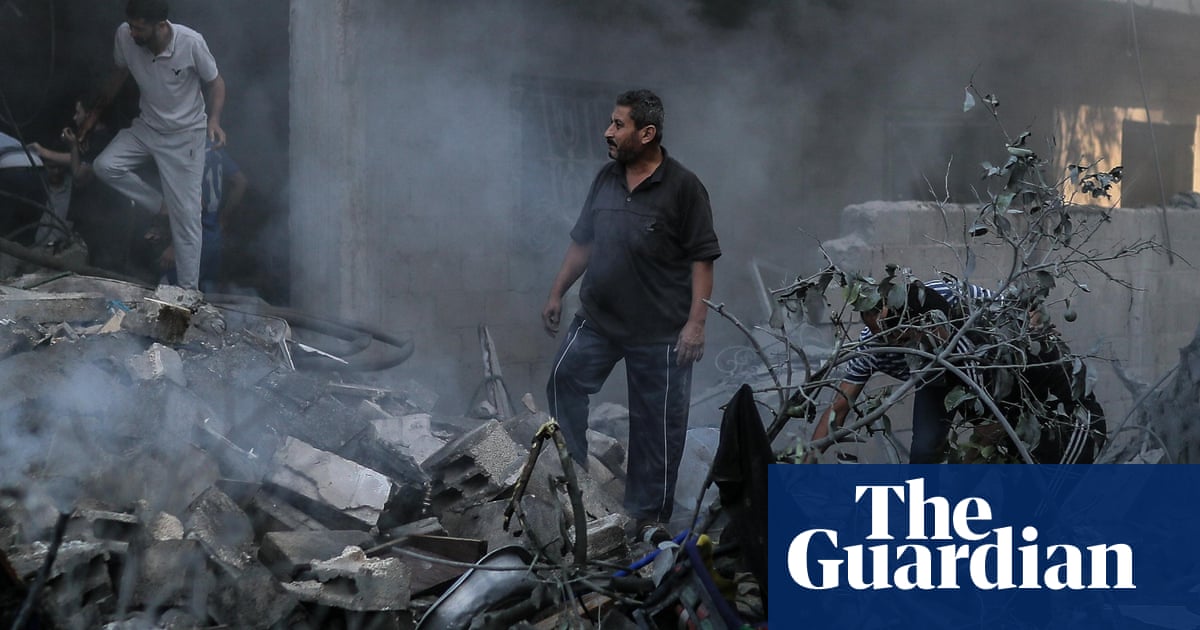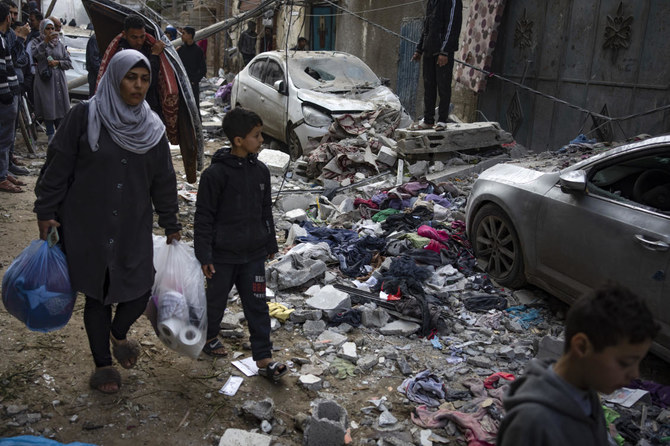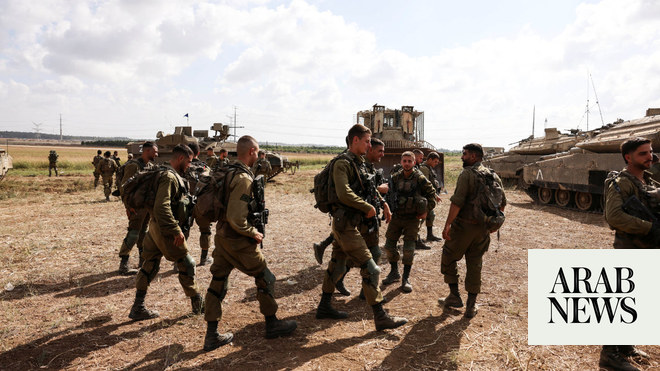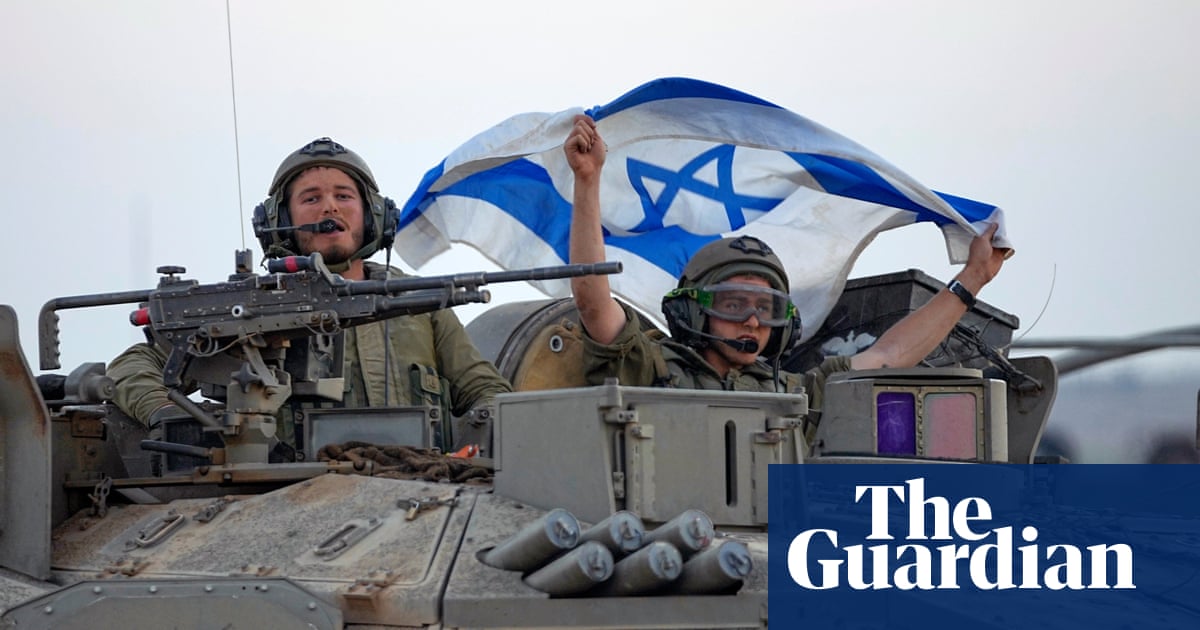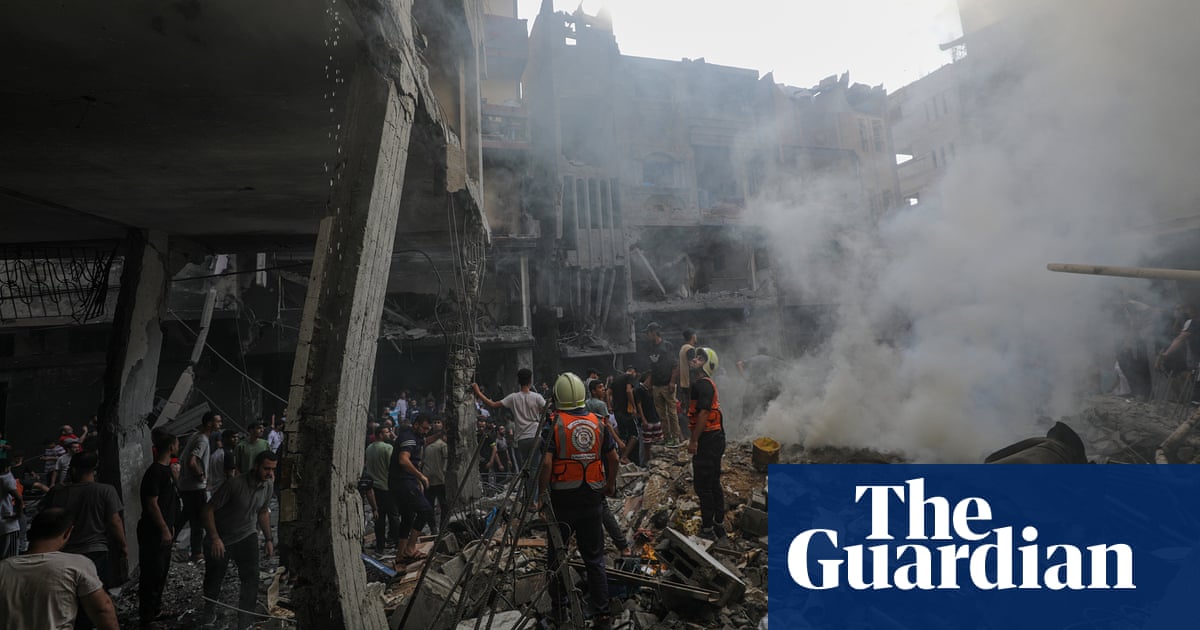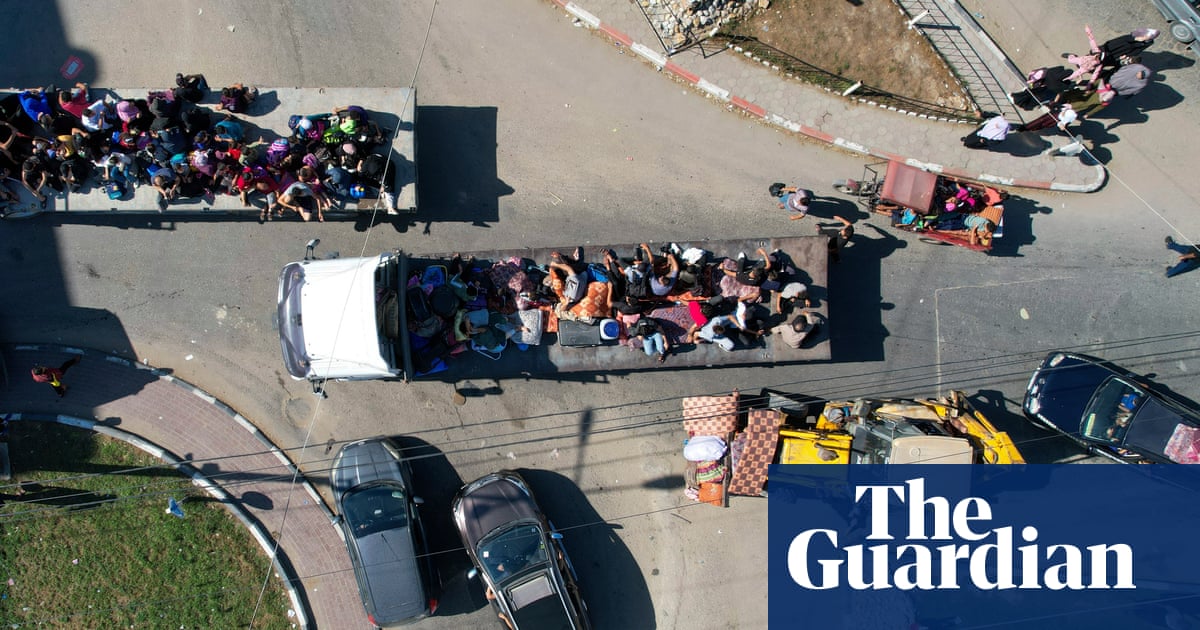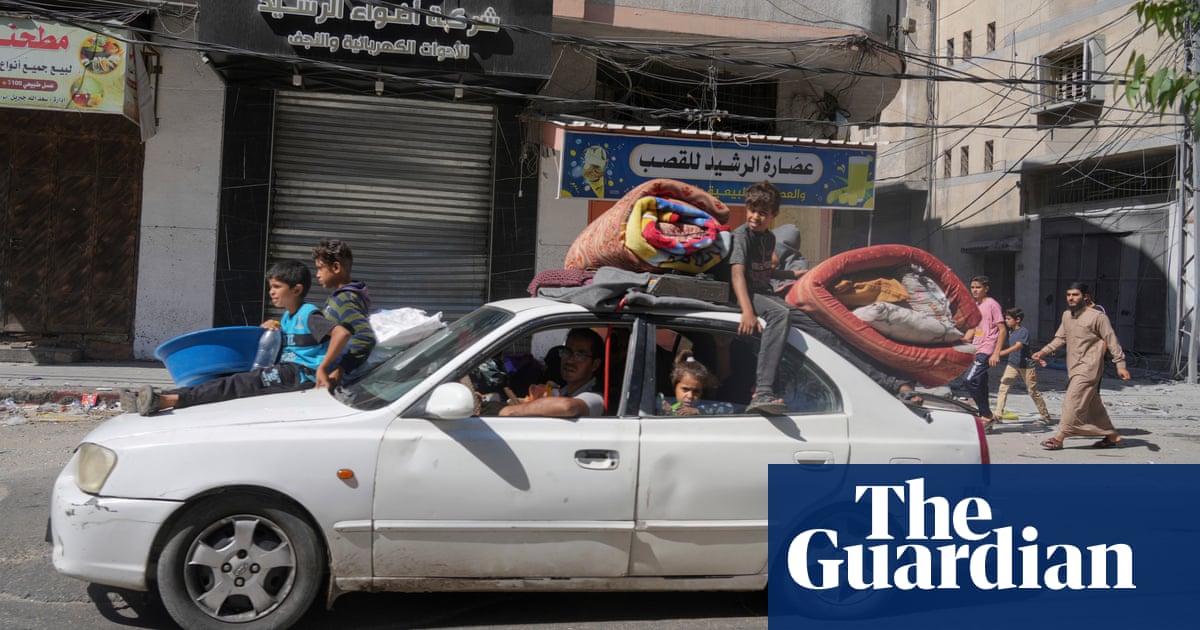
Thousands of people have been fleeing to the southern half of Gaza before an expected ground invasion of the blockaded strip as the Israeli-Palestinian conflict descends into its bloodiest period in decades.
Hamas said 70 people had been killed when warplanes struck cars fleeing south on Friday, while Israel’s military said that its troops backed by tanks had conducted the first raids inside Gaza since the crisis began.
Amid growing fears of escalating violence on several fronts after last weekend’s massacre of Israeli civilians by the militant group Hamas, almost half of Gaza’s 2.3 million trapped civilians faced the decision of whether to leave home, possibly never to return, after the Israeli army issued mass evacuation orders in the early hours of Friday.
Messages from Hamas broadcast by mosques around the strip called on residents to stay put on Friday after the order from Israel for the population to move south of the Gaza River, just south of Gaza City. Hamas called it “Israeli propaganda” and urged residents to “hold on to your homes and land”.
Joe Biden said it was a priority to “urgently address the humanitarian crisis” in Gaza. “We can’t lose sight of the fact that the overwhelming majority of Palestinians had nothing to do with Hamas and Hamas’s appalling attacks, and they’re suffering as a result as well,” he said.
The UN warned that the order to flee en masse would be calamitous, and urged Israel to reverse its order. The UN secretary-general, António Guterres, said the situation in Gaza had reached “a dangerous new low” and called for immediate humanitarian access. “Even wars have rules,” he said.
But Israel’s prime minister, Benjamin Netanyahu, said the bombardment of Gaza was “just the beginning” of his country’s response. “Our enemies have only just begun to pay the price,” he said late on Friday.
For most of the day there were no signs of mass movement. But as the afternoon wore on, it appeared many people had decided that if they were going to move, it had to be before nightfall. The strip, where Israel has cut off electricity, would be plunged into a sixth night of total darkness amid continued airstrikes and shelling.
By about 3pm, thousands of people from the northern town of Beit Hanoun and the sprawling Gaza City had begun making their way south by any means possible. Some packed into cars and trucks, but with fuel supplies low because of the tightening of Israel’s siege on the Mediterranean enclave, many were walking distances of more than 12 miles (20km).
Israel’s order to get out came six days after an audacious attack by Hamas gunmen early on Saturday, on a Jewish holiday. At least 1,200 militants burst through dozens of points on the heavily militarised boundary around the Gaza Strip before fanning out to rampage through 22 Israeli towns and kibbutzim and 10 army bases.
The Rafah crossing into Egypt is still closed to fleeing civilians in Gaza. And for those who are severely ill or have been injured by airstrikes that have pounded the 26-mile by 7-mile strip for the last six days, the World Health Organization has said the ultimatum is as good as “a death sentence”. Aid agencies have described the evacuation order under such circumstances, and so quickly, as “logistically impossible”.
More than 450,000 people have already left their homes at least once since Saturday, according to the Palestinian health ministry. For many, the week’s events are comparable to the Nakba, the Arabic term for the forcible expulsion of about 750,000 Palestinians from what was previously British mandate-controlled Palestine during the creation of Israel in 1948.
Yusuf Abu Rish, the head of Gaza City’s al-Shifa hospital, said: “It’s really a new Nakba and it’s even worse than the first one. No one can imagine what is going on on the ground, it’s horrible. Even if there is a decision to evacuate, it’s not applicable at all … they [patients] will die.”
In the besieged territory, the evacuation notice issued in the early hours of Friday sent panic through the civilian population and civil defence teams, who were already struggling under intense Israeli airstrikes that have killed 1,900 people so far, levelling entire neighbourhoods. The Israeli directive charged that Hamas militants were hiding in tunnels under Gaza City.
Israel is not allowing food, fuel or medical supplies into the strip in a tightening of its blockade, a move that the UN considers a war crime.
An Israel Defence Forces (IDF) spokesperson admitted in a briefing on Friday morning that it would take time for Palestinians to follow the orders to evacuate. In response to questions from the Guardian, the army’s media desk refused to clarify what time the order was sent, and whether it included a 24-hour deadline, as the UN reported.
More than 1,300 people were killed on what has been described as Israel’s 9/11 – more Israeli deaths than in the entirety of the five-year intifada, or Palestinian uprising, of the 2000s.
As reporters have gained access to affected towns and kibbutzim this week, the scale of the carnage has become clearer. IDF officials said they entered homes strewn with bodies, finding women who had been raped and killed, and children who had been shot and burned.
In response, Israel has already mounted the heaviest airstrikes on Gaza ever, mobilised an unparalleled 360,000 reservists, and amassed convoys of tanks near the border before what is almost certain to be a major ground offensive lasting months.
Scores of Israeli and foreign hostages were taken back to Gaza after Saturday’s attack; Hamas claimed on Friday that 13 captives had been killed in Israeli strikes over the last 24 hours.
Human Rights Watch accused Israel on Thursday of using white phosphorus munitions in operations in Gaza and Lebanon, allegations the army has denied.
The expected incursion would be a pivotal moment in Israel’s war with Hamas – the fifth during the 16 years since the group seized control of Gaza, leading Israel and Egypt to impose a blockade.
It could also inflame fighting elsewhere: fierce clashes between Palestinians and Israeli settlers and army personnel broke out around occupied East Jerusalem and the West Bank on Friday, killing at least 11, while to the north, a Reuters journalist was killed and six others from AFP, Reuters and Al Jazeera were wounded when they were caught in cross-border shelling across the border with Lebanon.
Hezbollah, the Iran-backed militant group, has conveyed via mediators that it will be drawn into the fray if Israel launches a ground assault in Gaza.
On Friday, Iran’s foreign minister, Hossein Amir-Abdollahian, said: “If these organised war crimes that are committed by the Zionist entity don’t stop immediately, then we can imagine any possibility”.
There is still no safe place for Gaza’s civilians to go. Cairo, a frequent mediator between Israel and the Palestinians, has discussed plans with the US to provide humanitarian aid but has rejected moves to set up safe corridors for refugees.
Mahmoud Abbas, the Palestinian Authority president in control of parts of the West Bank, told the visiting US secretary of state, Antony Blinken, in emergency talks in the Jordanian capital, Amman, that he “rejects the forced displacement” of Palestinians in Gaza. Across the world, rallies and protests in support of the Palestinian people were held on Friday: tens of thousands of people gathered in Tahrir Square in the Iraqi capital of Baghdad, waving Palestinian flags and burning the Israeli flag while chanting anti-US and anti-Israeli slogans.
Jewish communities also held rallies in solidarity with Israel.




